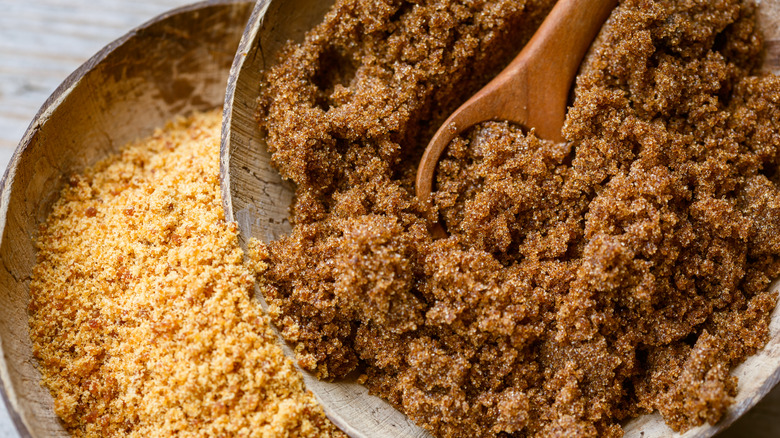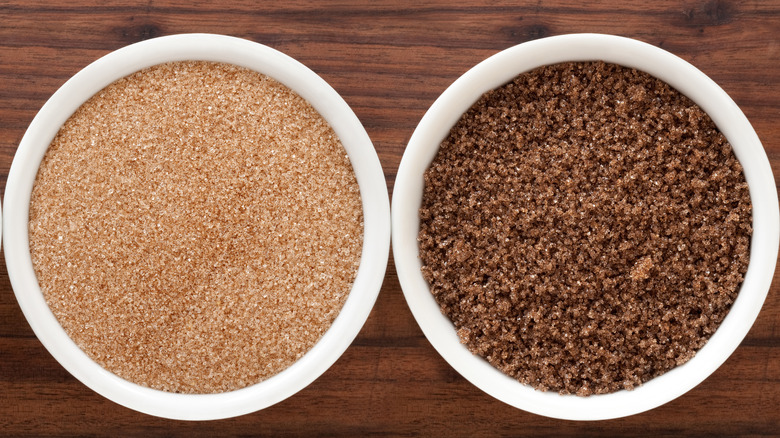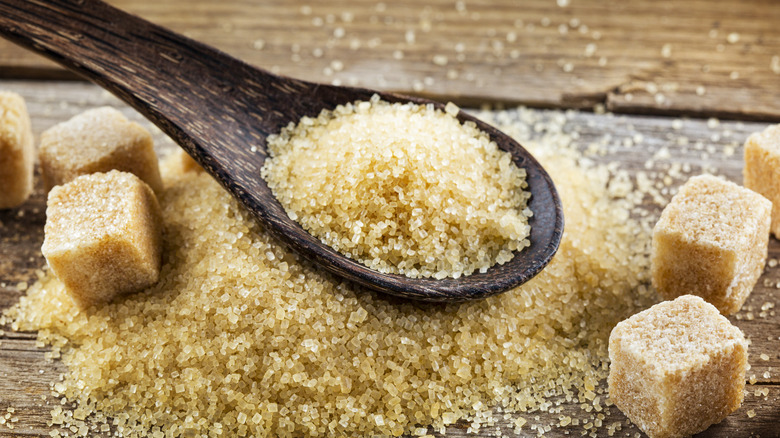A Simple Guide To Substituting Brown Sugar, Light Or Dark
If you were to name the holy trinity of baking goods, that'd have to be flour, sugar, and butter. Whether you're mixing up a cake or sugar cookies or cinnamon rolls, you're surely going to need all three. Brown sugar, which is simply white sugar plus molasses, is called for nearly as often as basic white sugar and lends a richer, caramel flavor and color.
If you find yourself making spur-of-the-moment cookies only to realize you have dark brown sugar when your recipe calls for light, or vice versa, never fear. While baking can be seen as something of an exact science, and certainly science is involved, recipes are forgiving when it comes to substituting light for dark or dark for light. In many cases, you can get away with using them interchangeably, but if you're baking by the book, you can do a little math to correctly substitute.
Light brown sugar contains 3.5% molasses, and dark sugar has almost double — 6.5%. So if your recipe calls for dark brown sugar but you only have light, add 1 tablespoon of molasses for every cup of sugar. If you have neither but have white sugar and molasses, take 1 cup of plain white sugar and add 1 tablespoon of molasses and combine with a mixer or the back of a fork, which will create light brown sugar. For dark brown, another ½ to 1 tablespoon of molasses should add the needed extra color and richness.
Light and dark brown sugar are usually interchangeable
Most of us aren't looking to bring more math into the kitchen — it's trying enough to convert metric measurements or figure out how to halve or double a recipe if you ask us. So it's good news that using either type of brown sugar, dark or light, won't make or break your recipe and won't substantially change the outcome — usually. They're more or less interchangeable, with a caveat.
If a recipe calls for light but you only have dark, go ahead and swap out — your chocolate chip cookies won't be ruined. But if you're after a very specific flavor or amount of leavening for a baked good, the difference in molasses actually can slightly alter both. The higher molasses content in dark versus light brown sugar brings a heartier, stronger caramel flavor and denseness to cookies. It also introduces an acidic presence that mixes with leavenings like baking soda and can cause baked goods to rise more.
If a recipe calls for a mix of brown sugar and white, or all of one or the other, odds are there's a reason for it. If you want to learn your preference or are simply curious, do a side-by-side comparison of one recipe made with white versus light brown versus dark brown sugar and see which texture and taste you like most.
Keep light brown sugar, which is more commonly called for, in the pantry
There's a good chance that if a recipe calls for brown sugar, it's talking about the light variety. Unless a recipe specifically mentions dark brown sugar by name, such as sweets like gingerbread, pecan pie, or brown sugar-glazed Brussels sprouts — which need that signature dark decadence, when a recipe says "brown sugar," grab the light stuff. Keep a bag around and store it in an airtight container or employ other easy hacks to keep brown sugar fresh and soft for longer.
As for the other brown-hued sugar options on shelves, how do they stack up compared to what we think of when we say brown sugar? Unlike conventional light or dark brown sugar, which has molasses manually added to it after processing removes it, varieties like turbinado or muscovado are brown in coloring and also retain their naturally occurring molasses. However, not all of these less refined types work as well for when making your own brown sugar or substitutions, so stick to the conventional white sugar for that. If you're in the mood to experiment with your sugar in general, though, there's a whole rainbow of types of sugar, all with varying colors and coarseness to their grain, as well as differing moisture, acidity, and sweetness levels.


